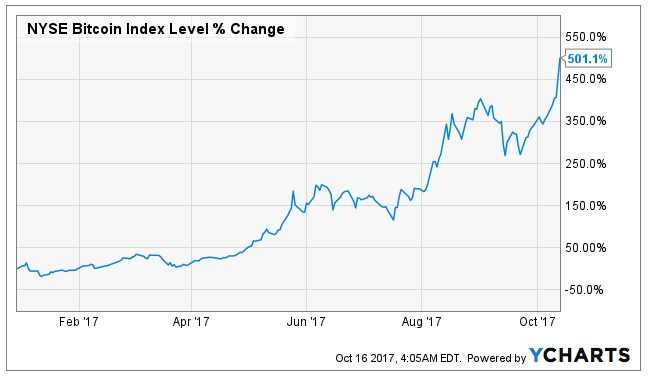Blockchain is causing massive disruption in the global economic landscape with Bitcoin and other cryptocurrencies. Now, traditional financial institutions must take proactive steps to manage the evolution of money or watch their control over monetary supply fade away as cryptocurrency displace fiat currencies.
Bitcoin is probably the most recognized use of Blockchain technology and people buy the cryptocurrency to shift away from government's influence on the monetary policy. Bitcoin has rewarded brave investors and the NYSE Bitcoin Index is up by an incredible 501.1% year-to-date gains as seen in the chart below.
However, no week seems to pass by without Bitcoin being subject to vitriol, insult, outright condemnation by skeptics. JPMorgan's (NYSE:JPM) Jamie Dimon has famously called Bitcoin a "fraud," the SEC has warned that Bitcoin is a commodity and not a currency, and China is cracking down on Bitcoin exchanges. The fact that Bitcoin's value is based on consensus and the fact that governments are yet to support the consensus has been one of the key reasons behind Bitcoin's gut-wrenching volatility.
There's More To Blockchain Than Bitcoin
There's more to Blockchain than Bitcoin and other cryptocurrencies. If you are not comfortable with the fundamental value proposition of Bitcoin, you can still find ways to invest in blockchain technology as the industry continues to grow.
Blockchain is changing the real estate landscape with solutions to tokenize real estate transactions with fractional ownership in real estate. Blockchain has shown an impressive ability to revolutionize the service industry with Smart Contracts that use blockchain-based solutions to execute the terms of a contract. Ethereum for instance is built specifically for creating and executing smart contracts that are paid for by Ether. This piece provides insight into opportunities to invest in Blockchain without necessarily buying Bitcoin.
Cybersecurity
Cybersecurity is on track to become of the biggest industries globally as the world continues to evolve into a digital-based ecosystem with the Internet of things. Cybercriminals are fast, nimble, and innovative in finding ways to exploit internet-based solutions for illicit gains. Malware, Ransomware, Phishing scams, DDoS attack, and malicious attacks are just few of the ways criminals could cripple the operations of businesses, organizations and governments.
Gladius plans to build a fully decentralized peer-to-peer platform where businesses can buy speedy content delivery and DDoS mitigation services. People can run the Gladius peer client on their computers (in the background) to monetize the underutilized bandwidth and spare storage as part of a pool providing unassailable protection for websites against DDoS attacks, and accelerate them at the same time. Hence, any cybercriminal intent on perpetrating a DDoS attack on a website protected by Gladius will need to identify and disable thousands (possibly millions) of computers and nodes, unlike a centralized solution, before they can execute the DDoS attack on their target.
DDoS attacks are very devastating, costly, and the current protections against them are very expensive. A 2016 DDoS attack on Dyn crashed CNN, Reddit, Twitter (NYSE:TWTR) and Netflix (NASDAQ:NFLX) among other for a full day resulting in billions of dollars in losses. Interestingly, the cost of services rendered by the existing DDoS protection is very expensive because you pay for protection all the same irrespective of whether you were hit or not.
Gladius is working on reducing the costs of protection against DDoS attacks while offering an impregnable protection against attacks. On Gladius' platform, clients only need to pay a minimum and incur extra costs when Gladius is actually deployed against DDoS attacks targeted at them. Gladius is doing a token sale in November. Because of the fact that DDoS attacks cost about $150 billion damage annually suggests that there's something in the market for investors.
Facilitating Stock Trading
Traditional Wall Street investors might want to consider putting their skepticism on Blockchain aside and pay special attention to how Blockchain technology can be used to revolutionize equities trading. Blockchain technology can be leveraged for ending the use of paper stock certificates and for speeding up transaction settlement times for stock trading.
In 2015, Nasdaq Inc. (NASDAQ:NDAQ) revealed that it had piloted the use of Blockchain technology for the issuance of the shares of a private company. You should note that NASDAQ is the second largest stock exchange in the world by market cap, after the NYSE. In a statement by Bod Greifeld, NASDAQ's CEO Through this initial application of blockchain technology, we begin a process that could revolutionize the core of capital markets infrastructure systems." NASDAQ also hopes to one-day leverage blockchain for stock issuance and trading for public companies.
Investors may not want to invest in Bitcoin, but it would be foolhardy to ignore the potential that Blockchain holds for facilitating stock trading. The cost of trading such as transaction fees will be greatly reduced to increase investor returns. Transactional times will also be reduced in order to even the playing field for retail traders and high frequency traders.
Cloud-Based Blockchain As A Service
International Business Machines (NYSE:IBM) is one of the biggest mainstream supporters of Blockchain technology. Earlier in 2017, the firm launched its IBM Blockchain solution that helps businesses to digitalize their transaction workflows by building enterprise applications on IBM's cloud.
Las week, IBM and Stellar launched a Blockchain banking solution that can be used for moving money across 12 "currency corridors" in the South Pacific. Jesse Lund, IBM’s VP of Blockchain notes that Blockchain banking " is the next step in the evolution of blockchain technology. It’s live money moving around a network.”
Wal-Mart Stores (NYSE:WMT) is working on ways to leverage IBM's blockchain solution to use the technology to track inventory in its stores in a tamper-proof decentralized platform. Everledger wants to reduce the logistics of identifying, authenticating, selling, and purchasing diamonds by using Blockchain to track who owns what diamond per time.
Ginni Rometty, CEO of IBM submits that Blockchain will play an important role for the company in reducing costs, creating new revenue streams, and helping it to build a competitive advantage in the industry. In her 2016 annual report, she notes that, "Blockchain will do for trusted transactions what the Internet did for information… IBM is already working with more than 400 clients to pioneer blockchain for business. They include clients who manage foreign exchange settlements, smart contracts, identity management and trade finance—but the potential goes well beyond financial services.

